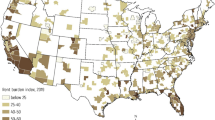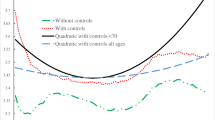Abstract
A commonality in the economics of happiness literature is that absolute income matters more for the subjective wellbeing of people at low income levels. In this article, we use a large sample of people in rural areas of developing countries with relatively low income levels to test whether subjective wellbeing an increasing function of absolute income in our sample, and to analyze the existence of adaptation and social comparison effects on subjective wellbeing. Our sample includes 6,973 rural households in 23 countries throughout Asia, Africa, and Latin America. The average total income per adult equivalent in our sample was US$ 1555, whereas levels of subjective wellbeing resembled levels found in previous research using cross-country data. We find that, despite low levels of absolute income, levels of subjective wellbeing of our respondents resemble levels found in previous research using cross-country data. We also find remarkable similarities in many of the determinants of subjective wellbeing previously tested. Our data show that absolute income covariates with subjective wellbeing, but—as for richer samples—the magnitude of the association is lower once we control for adaptation and social comparison. Finally, our results suggest that social comparison has a stronger effect than adaptation in explaining the subjective wellbeing of our sample. Our findings highlight the importance of adaptation and social comparison even at low levels of absolute income.
Similar content being viewed by others
Notes
Subjective wellbeing is an umbrella term that includes the various types of evaluation of one's life (self-esteem, joy, fulfillment, etc.). We use the terms happiness, subjective wellbeing, and life satisfaction interchangeably in the text.
We decided to keep in our sample also households who missed one of the four quarters. For households participating in only three of the four quarterly surveys, we calculated the income for the missing quarter as the average of the non-missing quarters adjusted by a trend factor we defined as the ratio of village average for missing quarters to village average for non-missing quarters.
We follow the formula used in World Bank analyses, which is a variant of the OECD scales (Atkinson, Rainwater and Smeeding, 1995): children below 15 years and adults above 65 years get a weight of 0.5, while all other household members (15–65 years) get a weight of 1.
We subtracted the mean income at the site level from the household income, and divided the result by the standard error so that the relative income has a (0,1) distribution.
References
Akay, A., & Martinsson, P. (2011). Does relative income matter for the very poor? Evidence from rural Ethiopia. Economics Letters, 110, 213–215.
Angeles, L. (2010). Adaptation or social comparison? The effects of income on happiness. SIRE discussion papers.
Angelsen, A., Larsen, H., Lund, J., Smith-Hall, C., & Wunder, S. (2012). Measuring livelihoods and environmental dependence: Methods for research and fieldwork. London: Earthscan.
Asadullah, M. N., & Chadhury, N. (2012). Subjective well-being and relative poverty in rural Bangladesh. Journal of Economic Psychology, 33, 940–950.
Blanchflower, D. G., & Oswald, A. J. (2004). Well-being over time in Britain and the USA. Journal of Public Economics, 88, 1359–1386.
Burchardt, T. (2005). Are one man’s rags another man’s riches? Identifying adaptive preferences using panel data. Social Indicators Research, 74, 57–102.
Camfield, L., Guillen-Royo, M., & Velazco, J. (2010). Does needs satisfaction matter for psychological and subjective wellbeing in developing countries: A mixed-methods illustration from Bangladesh and Thailand. Journal of Happiness Studies, 11(4), 497–516. doi:10.1007/s10902-009-9154-5.
Carlsson, F., Gupta, G., & Johansson-Stenman, O. (2009). Keeping up with the Vaishyas? Caste and relative standing in India. Oxford Economic Papers- New Series, 61(1), 52–73.
Clark, A. E., Frijters, P., & Shields, M. A. (2008). Relative income, happiness, and utility: An explanation for the Easterlin paradox and other puzzles. Journal of Economic Literature, 46(1), 95–144.
Deaton, A. (2008). Income, health, and well-being around the world: Evidence from the Gallup World Poll. Journal of Economic Perspectives, 22(2), 53–72.
DeNeve, K. M., & Cooper, H. (1998). The happy personality: A meta-analysis of 137 personality traits and subjective well-being. Psychological Bulletin, 124, 197–229.
Di Tella, R., Haisken-DeNew, J. P., & MacCulloch, R. (2010). Happiness adaptation to income and to status in an individual panel. Journal of Economic Behavior & Organization, 76(3), 834–852.
Di Tella, R., & MacCulloch, R. (2008). Gross national happiness as an answer to the Easterlin Paradox? Journal of Development Economics, 86, 22–42.
Diener, E., & Biswas-Diener, R. (2002). Will money increase subjective well-being? Social Indicators Research, 57(2), 119–169.
Diener, E., & Diener, M. (1995). Crosscultural correlates of life satisfaction and self-esteem. Journal of Personality and Social Psychology, 68, 653–663.
Diener, E., Lucas, R. E., & Scollon, C. N. (2006). Beyond the hedonic treadmill: Revisions to the adaptation theory of well-being. American Psychologist, 61, 305–314.
Diener, E., & Oishi, S. (2005). The nonobvious social psychology of happiness. Psychological Inquiry, 16, 162–167.
Diener, E., Oishi, S., & Lucas, R. E. (2003). Personality, culture, and subjective well-being: Emotional and cognitive evaluations of life. Annual Review of Psychology, 54, 403–425.
Diener, E., Lucas, R. E., & Oishi, S. (2002). Subjective well-being: The science of happiness and life satisfaction. In C. R. Snyder & S. J. Lopez (Eds.), Handbook of positive psychology (pp. 63–65). Oxford Oxford University Press.
Diener, E., Sandvik, E., Seidlitz, L., & Diener, M. (1993). The relationship between income and subjective well-being: Relative or absolute? Social Indicators Research, 28, 195–223.
Diener, E., & Seligman, M. E. P. (2004). Beyond money: Toward and economy of well-being. Psychological Science in the Public Interest, 5(1), 1–31.
Diener, E., Suh, E., Lucas, R. E., & Smith, H. E. (1999). Subjective well-being: Three decades of progress. Psychological Bulletin, 125, 276–302.
Duesenberry, J. S. (1949). Income saving and the theory of consumer behavior. Cambridge, MA: Harvard University Press.
Easterlin, R. A. (1974). Does economic growth improve the human lot? Some empirical evidence. In P. David & M. Reder (Eds.), Nations and happiness in economic growth: Essays in honor of moses Abramowitz (pp. 89–125). New York: Academic Press.
Easterlin, R. A. (1995). Will raising the incomes of all increase the happiness of all. Journal of Economic Behavior & Organization, 27(1), 35–47.
Easterlin, R. A. (2003). Explaining happiness. Proceedings of the National Academy of Sciences of the United States of America, 100(19), 11176–11183. doi:10.1073/pnas.1633144100.
Easterlin, R. A., McVey, L. A., Switek, M., Sawangfa, O., & Zweig, J. S. (2010). The happiness—income paradox revisited. Proceedings of the National Academy of Sciences of the United States of America, 107(52), 22463–22468. doi:10.1073/pnas.1015962107.
Eid, M., & Diener, E. (2001). Norms for experiencing emotions in different cultures: Inter- and intranational differences. Journal of Personality and Social Psychology, 81, 869–885.
Fafchamps, M., & Kebede, B. (2008). Subjective well-being, disability and adaptation: A case study from rural Ethiopia. In D. Clark (Ed.), Adaptation and wellbeing. Cambridge: Cambridge University Press.
Fafchamps, M., & Shipi, F. (2008). Subjective welfare, isolation, and relative consumption. Journal of Development Economics, 86, 43–60.
Ferrer-i-Carbonell, A. (2005). Income and well-being: An empirical analysis of the comparison income effect. Journal of Public Economics, 89, 997–1019.
Ferrer-i-Carbonell, A., & Frijters, P. (2004). How important is methodology for the estimates of the determinants of happiness? Economic Journal, 114, 641–659.
Frey, B., & Stutzer, A. (2002). Happiness and economics: How the economy and institutions affect well-being. Princeton, NJ: Princeton University Press.
Graham, C., & Pettinato, S. (2002). Happiness and hardship. Opportunities and insecurity in new market economies. Washington, DC: Brookings Institution Press.
Guillen-Royo, M. (2011). Reference consumption and the subjective wellbeing of the poor in Peru. Journal of Economic Psychology, 32, 259–272.
Helliwell, J. F. (2003). How’s life? Combining individual and national variables to explain subjective well-being 1166. Economic Modelling, 20(2), 331–360.
Helliwell, J. F., Layard, R., & Sachs, J. D. (2012). The World Happiness Report. Columbia: The Earth Insitute, Columbia University.
Herrera, J., Razafindrakoto, M., & Roubaud, F. (2006). The determinants of subjective poverty: A comparative analysis between Madagascar and Peru. Document de travail DIAL. Paris: Development, Institutions and Analyses the Long Term.
Howell, C. J., Howell, R. T., & Schwabe, K. A. (2006). Does wealth enhance life satisfaction for people who are materially deprived? Exploring the association among the Orang Asli of peninsular Malaysia. Social Indicators Research, 76(3), 499–524.
Inglehart, R., & Rabier, J. R. (1986). Aspirations adapt to situations—But why are the Belgians so much happier than the French? A cross-cultural analysis of the subjective quality of life. In F. M. Andrews (Ed.), Research on the quality of life. Ann Arbor: Institute for Social Research University of Michigan.
Kahneman, D., & Tversky, A. (1979). Prospect theory: An analysis of decision under risk. Econometrica, 47, 263–291.
Kawachi, I., Kennedy, B. P., Lochner, S. M., & Prothrow-Stith, D. (1997). Social capital, income inequality, and mortality. American Journal of Public Health, 87, 1491–1498.
Kingdon, G., & Knight, J. (2006). Subjective well-being poverty vs. income poverty and capabilities poverty? The Journal of Development Studies, 42(7), 1199–1224.
Knight, J., & Gunatilaka, R. (2012). Income, aspirations and the hedonic treadmill in a poor society. Journal of Economic Behavior & Organization, 82, 67–81.
Knight, J., Song, L., & Gunatilaka, R. (2006). Subjective well-being and its determinants in rural China. China Economic Review, 20(4), 635–649.
Knight, J., Song, L., & Gunatilaka, R. (2009). Subjective well-being and its determinants in rural China. China Economic Review, 20, 635–649.
Kuegler, A. (2009). A curse of comparison: Evidence on reference groups for relative income concern. World Bank policy research. Washington, DC: World Bank.
Layard, R. (2005). Happiness: Lessons from a new science. New York: Penguin Press.
Linssen, R., van Kempen, L., & Kraaykamp, G. (2011). Subjective well-being in rural India: The curse of conspicuous consumption. Social Indicators Research, 101, 57–72.
Lucas, R. E., Clark, A. E., Georgellis, Y., & Diener, E. (2003). Re-examining adaptation and the setpoint model of happiness: Reactions to changes in marital status. Journal of Personality and Social Psychology, 84, 527–539.
Lyubomirsky, S., King, L., & Diener, E. (2005). The benefits of frequent positive affect: Does happiness lead to success? Psychological Bulletin, 131(6), 803–855.
Marmot, M. G., & Wilkinson, R. G. (Eds.). (1999). Social determinants of health. Oxford: Oxford University Press.
Myers, D. G. (1993). The pursuit of happiness. New York: Avon.
Myers, D. G., & Diener, E. (1995). Who is happy? Psychological Science, 6, 10–19.
Ravallion, M., & Lokshin, M. (2010). Who cares about relative deprivation? Journal of Economic Behavior & Organization, 73(2), 171–185.
Selin, H., & Davey, D. (2012). Happiness across cultures: Views of happiness and quality of life in non-western cultures (science across cultures: History and practice). The Netherlands: Springer.
Steel, P., Schmidt, J., & Shultz, J. (2008). Refining the relationship between personality and subjective well-being. Psychological Bulletin, 134, 138–161.
Stevenson, B., & Wolfers, J., (2008). Economic growth and happiness: Reassessing the Easterlin paradox. Brookings Papers on Economic Activity, (Spring), 1–87.
Subramanian, S. V., Kim, D., & Kawachi, I. (2005). Covariation in the socioeconomic determinants of self rated health and happiness: A multivariate multilevel analysis of individuals and communities in the USA 1150. Journal of Epidemiology and Community Health, 59(8), 664–669.
Suh, E., Diener, E., & Fujita, F. (1996). Events and subjective well-being: Only recent events matter. Journal of Personality and Social Psychology, 70(5), 1091–1102.
van den Bergh, J. C. J. M. (2011). Environment versus growth—A criticism of “degrowth” and a plea for “a-growth”. Ecological Economics, 70, 881–890.
Wilkinson, R. G. (1997). Comment: Income, inequality, and social cohesion. American Journal of Public Health, 87(9), 1504–1506.
Acknowledgments
We are grateful for the financial support to the PEN project from CIFOR, ESRC-DFID, and Danida. A. Pyhälä is funded by an ERC grant to V. Reyes-García (Grant agreement n° FP7-261971-LEK). Thanks also go to Resilient Dry Land Systems, ICRISAT-Patancheru for providing office facilities to Reyes-García, and to J. van den Bergh and two anonymous reviewers for comments to a previous version of this article.
Author information
Authors and Affiliations
Corresponding author
Rights and permissions
About this article
Cite this article
Reyes-García, V., Babigumira, R., Pyhälä, A. et al. Subjective Wellbeing and Income: Empirical Patterns in the Rural Developing World. J Happiness Stud 17, 773–791 (2016). https://doi.org/10.1007/s10902-014-9608-2
Published:
Issue Date:
DOI: https://doi.org/10.1007/s10902-014-9608-2




